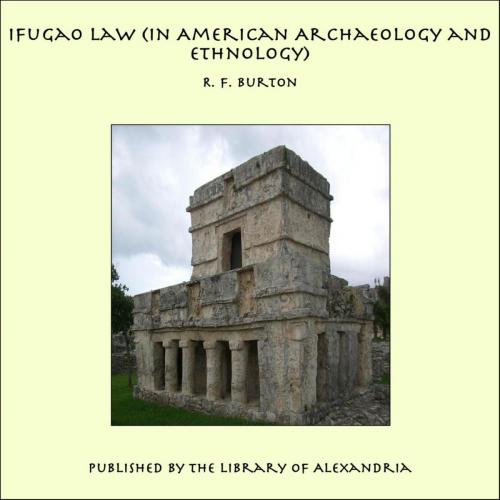Ifugao Law (In American Archaeology and Ethnology)
Nonfiction, Religion & Spirituality, New Age, History, Fiction & Literature| Author: | R. F. Burton | ISBN: | 9781465552495 |
| Publisher: | Library of Alexandria | Publication: | March 8, 2015 |
| Imprint: | Language: | English |
| Author: | R. F. Burton |
| ISBN: | 9781465552495 |
| Publisher: | Library of Alexandria |
| Publication: | March 8, 2015 |
| Imprint: | |
| Language: | English |
There is no law so strong as custom. How much more universal, willing, and spontaneous is obedience to the customary law that a necktie shall be worn with a stiff collar than is obedience to the ordained law against expectoration on sidewalks; notwithstanding that the latter has more basis in consideration of the public weal and even in aesthetics. This little paper shows how a people having no vestige of constituted authority or government, and therefore living in literal anarchy, dwell in comparative peace and security of life and property. This is owing to the fact of their homogeneity and to the fact that their law is based entirely on custom and taboo. The Ifugaos are a tribe of barbarian head-hunters. Nevertheless, after living among them for a period of eight years, I am fully satisfied that never, even before our government was established over them, was the loss of life from violence of all descriptions nearly so great among them as it is among ourselves. I do not, however, wish to be understood as advocating their state of society as ideal, or as in any way affording more than a few suggestions possibly to our own law-makers. Given dentists and physicians, however, I doubt gravely if any society in existence could afford so much advantage in the way of happiness and true freedom as does that of the Ifugaos. But we must realize that probably neither security of the individual life nor even happiness are the chief ends of existence. The progress and evolution of our people are much more important in all probability, and this seems to demand the sacrifice of ease and freedom and of much happiness on the part of the individuals composing our society
There is no law so strong as custom. How much more universal, willing, and spontaneous is obedience to the customary law that a necktie shall be worn with a stiff collar than is obedience to the ordained law against expectoration on sidewalks; notwithstanding that the latter has more basis in consideration of the public weal and even in aesthetics. This little paper shows how a people having no vestige of constituted authority or government, and therefore living in literal anarchy, dwell in comparative peace and security of life and property. This is owing to the fact of their homogeneity and to the fact that their law is based entirely on custom and taboo. The Ifugaos are a tribe of barbarian head-hunters. Nevertheless, after living among them for a period of eight years, I am fully satisfied that never, even before our government was established over them, was the loss of life from violence of all descriptions nearly so great among them as it is among ourselves. I do not, however, wish to be understood as advocating their state of society as ideal, or as in any way affording more than a few suggestions possibly to our own law-makers. Given dentists and physicians, however, I doubt gravely if any society in existence could afford so much advantage in the way of happiness and true freedom as does that of the Ifugaos. But we must realize that probably neither security of the individual life nor even happiness are the chief ends of existence. The progress and evolution of our people are much more important in all probability, and this seems to demand the sacrifice of ease and freedom and of much happiness on the part of the individuals composing our society















